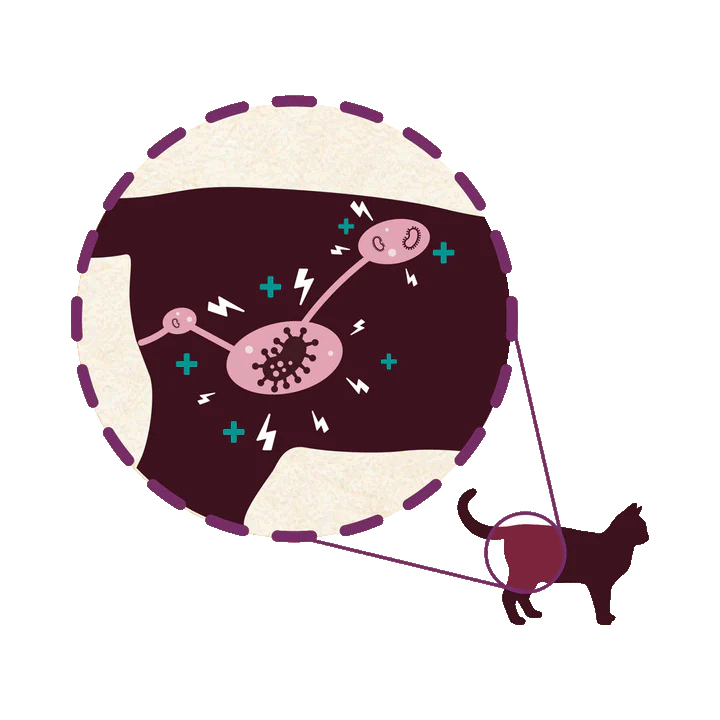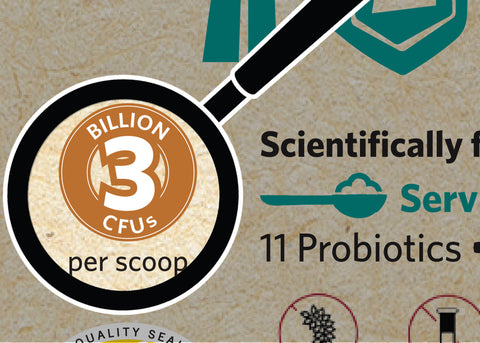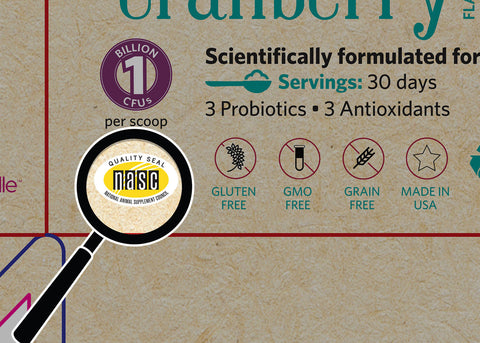Domestic cats often experience digestive issues. Probiotics, beneficial bacteria crucial to gut health, can help maintain a balanced gut environment.
For countless generations, the cat has been a celebrated carnivorous predator, skillfully navigating its place in the food chain. Cats are obligate carnivores, meaning these nimble creatures need a diet rich in protein in order to thrive. But the journey from wild hunters to house pets has had the side effect of a substantial shift in their diets. Without realizing it, cat owners often buy kibble bags bursting with grains rather than the meat these animals need. This evolution in diet has not been without consequences, and digestive issues have emerged as a common concern for our feline friends.
In the bustling ecosystem of a cat’s gut, there’s a special set of beneficial bacteria that play a crucial role in keeping them healthy.
Enter probiotics – the friendly bacteria that are often celebrated for their benefits to human health. These tiny superheroes populate the digestive tract and are essential in maintaining a balance that can mean the difference between a happy, healthy cat and one that's struggling. While many people are now incorporating probiotics into their own wellness routines, questions still arise when considering the same for cats. Is it safe? Is it beneficial? Let’s find out!

Understanding Your Cat’s Digestive System
Your cat’s digestive system has evolved over time to efficiently process meat. Starting at the mouth, cats have sharp teeth designed to tear flesh, unlike the flat molars that herbivores use for grinding plants. As obligate carnivores, their saliva does not contain digestive enzymes, so the initial breakdown of food occurs in the stomach.
After a cat ingests food, it travels down the esophagus and reaches the stomach, where strong acids and enzymes start to break it down. The partially digested food then moves down the GI tract into the small intestine and then onto the large intestine and colon before it’s excreted.
Importance of Gut Health in Cats
Maintaining a healthy digestive system is key in supporting a cat's overall well-being. Since their digestive tract is specialized for a high-protein diet, any imbalance or disruption to the gut microflora can lead to various health issues. A healthy gut ensures that the cat can effectively absorb nutrients from the food it consumes, which is important for energy, growth, and cell repair, especially as they age.
Your cat’s gut microbiome is also closely linked to several aspects of a cat’s health. A cat with a compromised digestive system might exhibit weight loss, lethargy, and changes in appetite. Issues like diarrhea, vomiting, upset stomach, and constipation can also arise from an unhealthy gut.
What Are Probiotics?
Probiotics, a term derived from Greek meaning "for life", are living microorganisms that offer a wide range of health benefits. They’re the good bacteria that naturally inhabit the digestive system and help maintain a balanced gut bacteria environment. Probiotics help in supporting digestion, inhibiting the growth of harmful bacteria, and supporting your cat’s immune system.
In the modern context, probiotics are commonly taken as dietary supplements or through foods that are fortified with specific strains of bacteria or yeast. These supplements aim to boost the natural population of beneficial microorganisms in the gut and promote digestive health.
Common Types of Probiotics
There is a wide variety of live bacteria that fall under the umbrella of probiotics. The most common types of probiotic bacteria include:
- Lactobacillus: This is perhaps the most common probiotic and is usually found in yogurt and other fermented foods. Different strains of Lactobacillus can help with diarrhea and may assist people who cannot digest lactose.
- Bifidobacterium: Found in certain dairy products, Bifidobacterium strains can help alleviate the symptoms of inflammatory bowel disease (IBD) and other digestive conditions.
- Enterococcus faecium: Often used in animal probiotics, this strain is known to improve gut microbial balance in pets.
Overall Benefits of Probiotics for Your Cat
While probiotic supplements have historically been for human consumption, animal advocates are leading the movement to ensure better microbial health for cats and dogs.
This movement for cat wellness by way of probiotics has been aided by an enormity of peer reviewed research.
According to Dr. R. Fuller in Probiotics in Man and Animals,
"There is good evidence that the complex microbial flora present in the gastrointestinal tract of all warm-blooded animals is effective in providing resistance to disease. However, the composition of this protective flora can be altered by dietary and environmental influences, making the host animal susceptible to disease and/or reducing its efficiency of food utilization […] What we are doing with the probiotic treatments is re-establishing the natural condition which exists in the wild animal."
Dr. Fuller's claims that the gut can be altered through dietary and environmental influences has been reaffirmed throughout the probiotic and animal supplement community.
Research into the benefits of probiotics for cats extends beyond Dr. Fuller, as Hiruta Yurga explains that, "The major outcomes from using probiotics include improvement in growth, reduction in mortality, and improvement in feed conversion efficiency."
Yurga goes on to insist that probiotics should be given regularly, “Increased short-term supplementation of probiotics may be useful under certain conditions but should be followed by continuous supplementation thereafter”.
Here are some of the specific benefits of probiotics for humans and animals alike:
- Digestive Health: By balancing the gut flora, probiotics promote healthy digestion and can alleviate symptoms such as bloating, cramping, and diarrhea.
- Immune Health: Probiotics bolster the immune system by enhancing the production of specific antibodies and supporting the activity of natural killer cells.
- Inhibition of Harmful Microorganisms: They help prevent infections by outcompeting harmful microorganisms for resources and attachment sites on the gut lining.
- Nutrient Absorption: Probiotics can enhance the absorption of minerals like calcium and magnesium, contributing to stronger bones and overall health.
- Mental Health: Emerging studies suggest a link between gut health and mental health. Probiotics may have potential benefits in managing conditions like depression and anxiety through the gut-brain axis.
- Reducing Allergies and Eczema: Some strains of probiotics have been shown to reduce the severity of allergies and eczema.
It’s important to note that while probiotics offer various benefits, their effectiveness can vary based on different strains and the individual characteristics of your cat’s digestive system. It’s also important to use them judiciously and preferably under the guidance of a healthcare professional.
How to Introduce Probiotics to Your Cat’s Diet
A Step by Step Guide
- Consult a Veterinarian: Before making any changes to your cat's diet, it is important to consult a veterinarian. Discuss your intention to add probiotics and heed their advice regarding the necessity and appropriateness for your cat’s needs.
-
Choose the Best Probiotic: Once you have the green light from the vet, choose a high-quality probiotic that is specifically formulated for cats. Pay attention to the strains of bacteria, the CFU (colony-forming units) count, and the NASC quality seal of approval.


- Start with a Small Dose: It's important to introduce probiotics gradually. Begin with a smaller dose than recommended on the packaging to allow your cat's digestive system to adjust.
- Monitor Your Cat's Reaction: Keep a close eye on your cat’s behavior and bowel movements. Note any changes, whether positive or negative.
- Slowly Increase the Dosage: If your cat is tolerating the probiotic well, gradually increase the dose to the recommended amount over a week or two.
- Establish a Routine: Consistency is key. Administer the probiotic at the same time each day, preferably mixed into your cat’s food.
Monitoring your Cat’s Reaction
- Look for Positive Changes: Ideally, you should notice positive changes such as firmer stools, fewer urinary issues, less foul-smelling waste, and an increase in energy.
- Be Cautious of Negative Symptoms: Be vigilant for any adverse side effects like diarrhea, vomiting, loss of appetite, or digestive upset. If these occur, it is important to consult your veterinarian.
Adjusting Doses and Schedules
- Evaluate Long-term Benefits: After your cat has been taking the probiotic for several weeks, evaluate whether you're noticing long-term benefits.
- Consulting a Veterinarian for Adjustments: If you feel that the probiotic isn’t having the desired effect, or if there are any adverse reactions, consult your veterinarian. They may recommend adjusting the dosage or trying a different product.
- Maintaining Regular Check-ups: Keep up with regular vet check-ups and discuss the long-term plan for probiotic use in your cat's diet. This is essential for ensuring that the probiotic continues to benefit your cat’s digestive health and overall well-being.
Remember that introducing probiotics should be a gradual and monitored process. Always keep the lines of communication open with your veterinarian to ensure that your cat is receiving the best care for its unique needs.
Prebiotics For Cats
While pet parents may be curious if they should include probiotics into their pet’s diet, prebiotics are a lesser known addition that may further support their health.
Prebiotics act as a fiber that promotes probiotic growth and ensures safe delivery to the gut before the hot environment of the cat's system damages, and potentially kills, the probiotic.
Does Human Grade vs Feed Grade Matter?
In the realm of pet supplements, it's disheartening to note that the regulatory oversight for cat and dog supplements doesn’t quite measure up to the scrutiny that human probiotics undergo. This occasional lapse in a system of checks can pave the way for supplements that might not live up to their claims, leaving pet parents and their furry companions in the lurch.
At Fidobiotics, we hold ourselves to a higher standard. We believe that our four-legged family members deserve nothing less than excellence. With an unwavering commitment to quality, we ensure that every product that bears the Fidobiotics name meets the gold standards of quality that both humans and their pets need.
🐾 Discover the Fidobiotics Line of Probiotics 🐾
Your pets deserve the best, and with Fidobiotics, that's precisely what they get.





